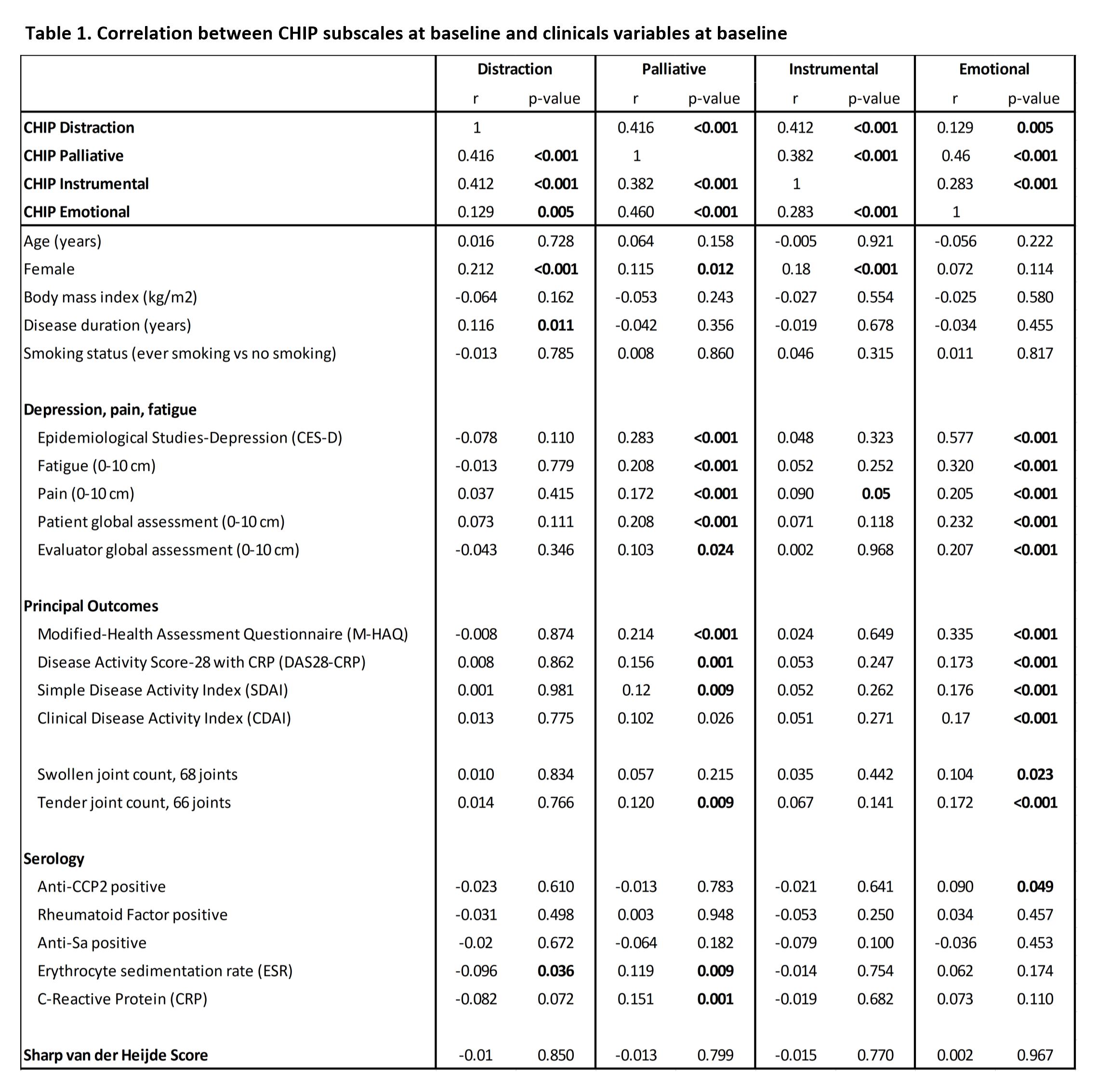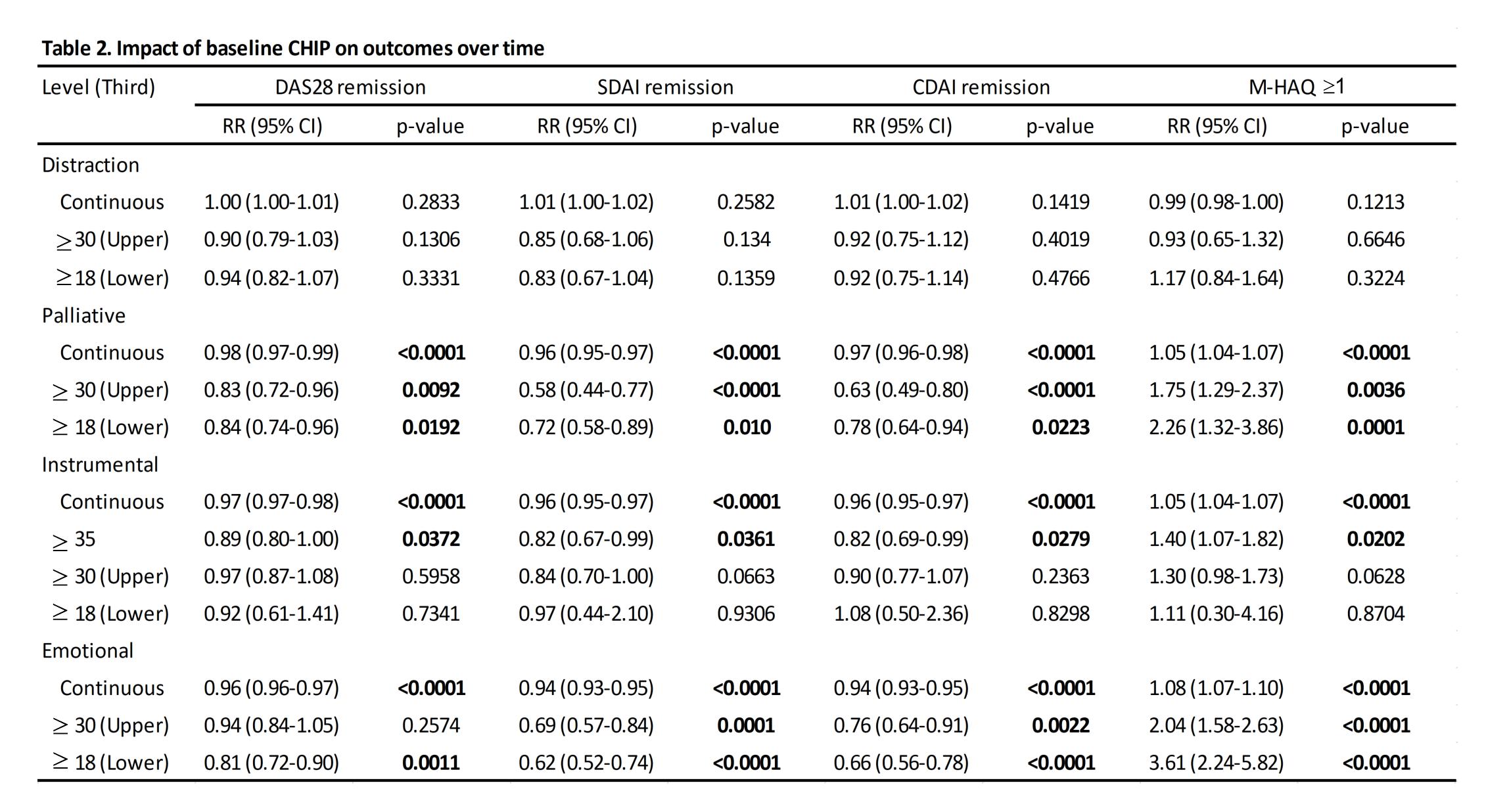Session Information
Date: Sunday, November 7, 2021
Title: RA – Diagnosis, Manifestations, & Outcomes Poster II: Miscellaneous Aspects of RA (0786–0812)
Session Type: Poster Session B
Session Time: 8:30AM-10:30AM
Background/Purpose: Patients recently diagnosed with RA employ various coping strategies. We aimed to describe these strategies over time and determine if specific strategies impacted patient outcomes.
Methods: Consecutive patients meeting the criteria for early RA identified at the Centre Hospitalier Universitaire de Sherbrooke(CHUS) self-administered the Coping with Health Injuries and Problems (CHIP) questionnaire at baseline and yearly follow-ups, up to 5 years. CHIP consists of 32 items with 4 subscales: Distraction, Palliative, Instrumental, Emotional, each containing 8 questions scored from 1 to 5. The scores (range 8-40) over time were examined by gender. Correlation between score and clinical variables at baseline were computed. Baseline scores were used to predict disease outcomes over time. The primary outcomes were: remission according to Simple Disease Activity Index (SDAI) and disability according to the Modified-Health Assessment Questionnaire (M-HAQ). CHIP scores were analyzed with the continuous scale and dichotomized according to the upper or lower third of the scale (≥30 or ≥18). P-values were calculated with linear mixed regression models for continuous outcomes or with generalized estimating equation for dichotomic outcomes.
Results: 482 patients were enrolled between August 2006 and October 2020 (61% female). Baseline mean scores (SD) were: 24.01 (6.46) for Distraction, 23.58 (6.07) for Palliative, 31.48 (5.35) for Instrumental and 25.10 (7.95) for Emotional.
For all subscales, females scored significantly higher than males and scores varied significantly over time (Figure 1). For Distraction and Palliative, scores declined faster in males than females, with significantly different slopes (interaction: gender*time).
At baseline, Emotional subscale was significantly correlated with depressive symptoms measured with Center for Epidemiological Studies-Depression (CES-D) (r=0.58) and with M-HAQ, fatigue, pain, disease activity according to the patient and the physician (r values between 0.20 to 0.33). Palliative subscale at baseline had significant correlations with the same variables, albeit weaker (r values 0.10 to 0.28) (Table 1).
For baseline Emotional subscale, subjects with a score of ≥18 had less SDAI remission over time (RR 95% CI: 0.62 (0.52-0.74), p< 0.001) and higher M-HAQ over time (RR: 3.61 (2.24-5.82), p< 0.001) (Table 2). For Palliative, the best cut-off for SDAI remission was lower third (RR: 0.58 (0.44-0.77), p< 0.001) and upper third for M-HAQ (RR: 2.26 (1.32-3.86), p< 0.001). For Instrumental, the mean baseline score was above the upper third cut-off (≥30); the best cut-off for both remission and M-HAQ was thus set higher at ≥35.
Conclusion: CHIP questionnaire describes coping styles when facing health challenges such as recent-onset RA. Coping strategies vary across gender, female having the highest scores at baseline and over time. When maladaptive coping strategies dominate (e.g., emotional) poor outcomes are encountered. Our results indicate that CHIP may be a novel predictor for RA outcomes. Analyzing whether coping strategies add to existing models to predict outcomes in early RA patients is warranted.
To cite this abstract in AMA style:
Akman Z, Boire G, Carrier N, Roux S, Masetto A, deBrum Fernandes A, Liang P, Dobkin P, Hugues A. Baseline Coping Strategies as Predictors of Outcomes in Patients with Early-onset Rheumatoid Arthritis (RA) [abstract]. Arthritis Rheumatol. 2021; 73 (suppl 9). https://acrabstracts.org/abstract/baseline-coping-strategies-as-predictors-of-outcomes-in-patients-with-early-onset-rheumatoid-arthritis-ra/. Accessed .« Back to ACR Convergence 2021
ACR Meeting Abstracts - https://acrabstracts.org/abstract/baseline-coping-strategies-as-predictors-of-outcomes-in-patients-with-early-onset-rheumatoid-arthritis-ra/



